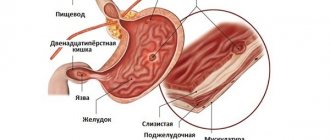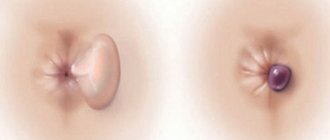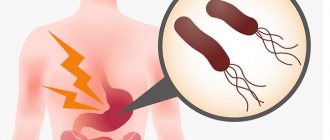Causes of blood taste in mouth
Reference! Most people have experienced this unpleasant sensation at least once in their lives. It would be useful for each of us to know about the main causes of such a symptom.
This is explained by the fact that some require mandatory consultation with a doctor.
Conventionally, all the reasons provoking the “bloody taste” can be divided into 3 groups :
- Oral problems.
- Internal pathologies.
- Reasons not related to the development of any disease.
Dental diseases
Most often, the feeling of blood in the mouth can occur due to diseases developing in the oral cavity:
- Gingivitis is a disease characterized by bleeding gums. Often accompanied by itching, swelling of the gums, and downward painful sensations.
- Periodontitis is bleeding of the periodontal tissues, which is accompanied by exposure of the neck of the tooth, suppuration, and bad breath.
- Stomatitis is a pathology accompanied by the appearance of ulcers on the mucosal epithelium, which begin to bleed. Wounds on the mucous membrane are very painful; another important sign of the disease is high body temperature.
Diseases of internal organs
Keep in mind! The taste of blood in the mouth is often caused by the development of diseases of the internal organs:
- Respiratory diseases. Among them are bronchitis, pneumonia, lung abscess, tonsillitis, runny nose, sinusitis, bronchiectasis, tuberculosis, cystic fibrosis, lung cancer . As a rule, such painful symptoms may be accompanied by difficulty breathing and coughing. There may also be blood in the saliva, purulent odor from the mouth, nasal discharge, and increased body temperature. And in difficult cases, uncontrolled weight loss is possible. Due to the disease, the capillaries of the respiratory organs become brittle and under different loads (coughing, sneezing) they instantly burst, causing minor bleeding.
- Diseases of the gastrointestinal tract. Inflammation of the mucous membrane is often accompanied by impaired vascular tone, which makes them brittle. Small ulcers on the surface of the digestive tract are sometimes “touched up.” As a result, if you have a history of diagnoses of “ulcer”, “gastritis”, “cholecystitis”, “pancreatitis ”, the feeling of blood in the mouth is a common occurrence. This assumption can also be confirmed by such manifestations of problems with the gastrointestinal tract as abdominal pain, nausea, vomiting, abnormal stool, and bad breath.
- Diseases of the cardiovascular system provoke thinning of the walls of blood vessels, making them brittle. Other symptoms may also confirm this reason. Among them are pain in the heart, cold feet and hands, dizziness, shortness of breath, darkening in the eyes.
- Neurological diseases. The signal to taste buds is sent from the brain through nerve fibers. Any disruption of signal transmission distorts the nerve impulse, as a result of which a malfunction in taste sensations may occur. Often this situation is accompanied by increased irritability, headache, trembling of hands and eyelids, and hearing problems.
- Anemia. A decrease in hemoglobin levels often causes a taste of blood in the mouth. Other symptoms may accompany this condition. This may include weakness, drowsiness, frequent dizziness, headaches, tachycardia, decreased intelligence and physical abilities.
- Diabetes. The sensation of blood in the mouth also develops as blood sugar levels rise. Concomitant symptoms can confirm this assumption. There may be increased appetite, constant thirst, dry skin, decreased visual acuity.
Other symptoms
Stay up to date! The last group of reasons includes the following:
- Taking certain medications that affect the composition of saliva. Most often, this sensation is caused by antibacterial, antihistamines, vitamins for pregnant women, supplements containing iron, and ganglion blockers.
- Injuries to the oral mucosa that cause blood to enter the taste buds in the mouth. Blood can be released for the following reasons: the presence of tartar, the use of a hard toothbrush, the formation of a wound on the inside of the cheek or on the tongue due to a chipped tooth, due to improperly installed dentures or braces, biting the cheek while eating.
- Poisoning with heavy metals (zinc, lead, mercury). A similar reason is relevant for those who work in chemical laboratories and metal processing plants. Confirmation of this reason may include nausea, vomiting, weakness, dry cough, swelling of the gums, aching limbs, and increased body temperature.
Why does it occur in the morning
The feeling of the taste of blood in the mouth in the morning sometimes means that a person is sick with a chronic disease, for example, ENT disease. When the nasopharynx is infected, its mucous membranes become thin and covered with erosions. The mucus formed at night dries out and injures the tissues of the nasopharynx and throat.
Bronchial asthma leads to disruption of the functions of taste buds, and the oral mucosa also dries out. If a person does not brush his teeth 2 times a day and does not treat those affected by caries, various pathogenic microbes begin to multiply, this leads to gingivitis. As a result, the taste of blood appears in the morning. This will continue until appropriate treatment is given.
What features of the causes of the symptom can be identified?
In men
It is worth noting! Men who lead an active lifestyle and engage in intense sports or heavy physical labor often experience a similar taste in their mouth.
Often this phenomenon is associated with increased blood pressure.
This occurs
due to physical exertion or overstrain of the pulmonary alveoli due to their excessive tension.
Among women
Some representatives of the fairer sex may experience a taste of blood during menstruation. This phenomenon is due to hormonal changes occurring in the body of every woman during this period.
A real hormonal “explosion” occurs during pregnancy , which can also provoke a bloody taste.
In children
For your information! Hormonal imbalance in a child's body occurs during puberty. Therefore, in adolescence, such child complaints are quite real.
If the child has not yet reached adolescence , then parents should consult a pediatrician without delay.
Diagnosis and treatment methods
When contacting a doctor with this problem, he will first conduct a survey, collect information about concomitant diseases, and examine the oral cavity. If he suspects that there are pathologies of internal organs, he will prescribe an ultrasound examination of the abdominal cavity and an x-ray of the lungs.
If the unpleasant sensation is associated with dental abnormalities, it is necessary to rinse your mouth as often as possible, change care products, and remove plaque and tartar in a timely manner. If symptoms occur infrequently, you should not consult a doctor; consultation will be needed if:
- this happens systematically;
- accompanied by headache and nausea;
- saliva turns scarlet.
Attention! In such cases, it is necessary to visit a dentist and gastroenterologist. They will carry out diagnostic measures, and then select the correct treatment regimen.
Once the diagnosis is established, appropriate treatment will be prescribed. If you experience a taste of blood in your mouth, you should exclude foods that cause discomfort from your diet. The same applies to medications. They are replaced with analogues. If there is no gastritis and other diseases of the gastrointestinal tract, a good option would be the systematic consumption of sour juices or water to which lemon juice has been added. If your gums are bleeding, it is recommended to rinse your mouth with herbal decoctions.
Why the feeling may be:
In the throat
The feeling of blood in the throat or its appearance there is an alarming symptom. As a rule, it develops due to:
- damage to the larynx as a result of burns from liquids, steam;
- chemical poisoning;
- laryngeal injuries;
- diseases of the digestive tract;
- diseases of the respiratory system.
After running in the mouth
Know! A bloody taste in the mouth can be felt by sports enthusiasts during their morning jog. Typically, this phenomenon can be caused by:
- Microtrauma of the capillaries of the respiratory system , which stretch during running more than usual due to intense breathing.
- Increased bleeding of the gums , which cannot withstand the rush of blood during physical exertion.
Typically, the taste of blood in your mouth during intense exercise is not a cause for concern.
All of these body reactions are completely natural and if the unpleasant sensation does not appear at rest, then there is no need to worry.
In the morning in the mouth
The manifestation of distorted taste sensations in the oral cavity in the morning can signal the presence of chronic diseases in the body :
- ENT organs (sinusitis, pharyngitis, tonsillitis, sinusitis, enlarged adenoids, chronic runny nose). Any inflammatory process thins the nasopharyngeal mucosa, provoking the development of ulcers on its surface. They easily begin to bleed when they receive microtrauma from a strong cough, sneezing, or blowing their nose.
- For nasal congestion or bronchial asthma. Lack of air due to inadequate breathing contributes to the drying out of the mucous membrane, as a result of which the taste buds give “wrong” information.
- Exacerbation of diseases of the gastrointestinal tract : ulcers, gastritis, pancreatitis, cholecystitis, varicose veins of the esophagus.
- Cardiovascular problems cause the walls of blood vessels to thin, causing them to become brittle. Such diseases are accompanied by coughing attacks in the morning, pain in the heart, shortness of breath, and a feeling of heaviness.
When coughing
A similar phenomenon is very common in respiratory diseases . It is especially acute in the morning , when coughing attacks are most intense.
Note! Along with a cough, mucus, sputum, and pus can be released from the mouth; sometimes all these secretions contain streaks of blood.
During pregnancy
Often pregnant women complain of changes in taste sensations, including the appearance of a taste of blood in the mouth.
Such changes may be caused by:
- Changes in hormonal levels. It definitely comes with pregnancy. This provokes a change in taste preferences and, at the same time, disrupts taste sensations. Thus, the taste of a familiar product can be perceived by a woman in a completely different way after conceiving a child.
- Problems in the oral cavity. During the period of bearing a child, many expectant mothers begin to experience problems with teeth and gums. Often they begin to worry about gingivitis, accompanied by bleeding gums, which is why they feel blood in the mouth.
- This symptom especially often manifests itself in the early stages , when the hemoglobin level in the body of the expectant mother begins to fall , that is, anemia develops. You can easily confirm the diagnosis by taking a blood test.
- While expecting a child, a woman's of smell often increases , which can also affect changes in taste.
- Use of special vitamin and mineral complexes. Their use is mandatory for pregnant women and may have a side effect in the form of a change in taste in the mouth.
In most cases, the unpleasant symptom will disappear on its own after the baby is born.
But you shouldn’t ignore the feeling: in any case, you should consult a doctor.
Taking medications
A side effect of medications may include a taste of blood in the mouth. If this happened precisely because of the medications, you should stop taking them and consult your doctor. Medicines belonging to the group can lead to such a reaction:
- ganglion blockers used for hypertension - Pyrilene, Pentamin, Hexonium;
- antihistamines – Diazolin, Claritin, Cetrin;
- antibiotics - Ampicillin, Levomycetin, Vilprafen.
The taste of blood in the mouth may appear after taking Centrum, Vitrum and other vitamin complexes intended for pregnant women. This reaction can be caused by medications that contain iron and nutritional supplements, for example, Ferlatum, Hemohelper.
Diagnostics
Important! If you experience a taste of blood in your mouth, you need to pay attention to several factors:
- What time of day does this pathology appear?
- Was this an isolated incident or does this happen systematically;
- Are there other manifestations of deviations from the norm?
Answers to all these questions will be required during a conversation with a therapist so that the diagnosis can be established as accurately as possible and, accordingly, adequate treatment can be prescribed.
The regular appearance of an unpleasant symptom at the same time of day , attacks of nausea, weakness, vomiting, frequent pain or spasms are signals of a serious disease of the internal organ.
After a diagnostic conversation, the doctor can examine the oral cavity .
If a problem is visually detected that is hidden there, he will redirect the patient to the dentist.
If a disease of the internal organs is suspected, the patient will be asked to undergo a series of studies to collect accurate information about the functioning of the entire body:
- Ultrasound of the abdominal cavity.
- X-rays of light.
- Blood, stool, urine tests.
- Sputum culture tank.
Know! Depending on the research results obtained and the complaints mentioned during the conversation, the therapist can redirect the patient to a gastroenterologist, pulmonologist, or cardiologist, who will carry out further therapy.
Injuries and physical stress
Sometimes injury to the mucous membrane leads to this problem. You may bite your lips or cheeks while sleeping, talking, or chewing. The taste of blood in the mouth is caused by:
- very rough brushing of teeth;
- poorly supplied dentures and braces;
- injury caused by a broken tooth or the sharp edge of a filling.
In all cases, the root cause must be eliminated. As a result of stress on the body, some manifestations become aggravated. Sometimes this happens during intense power loads. This means that the gums are very weak. During exercise, more blood flows in and they begin to bleed. Those men who are actively involved in sports or work hard jobs often develop a similar taste in their mouths.
What to do to treat and eliminate the symptom?
The best decision is to go see a doctor .
Only a highly qualified specialist can determine the true cause of the distortion of taste perception, as well as prescribe an adequate treatment regimen or give recommendations, the implementation of which can get rid of the unpleasant taste.
At home, you can try to eliminate the cause of the taste of blood in the mouth in the following ways:
- If your gums are bleeding, you should brush your teeth only with soft-bristled brushes. It is wise to use special pastes, the action of which is aimed at strengthening the blood vessels and capillaries that “supply” the gums with blood.
- For the same purpose, you can rinse your mouth daily with a decoction of sage and chamomile . Pour 5 g of dry raw material into 500 ml of boiling water, place on fire and boil for 5 - 7 minutes, then leave to infuse for 1 hour. You can use an infusion of oak bark. To do this, pour 10 g of raw material with half a liter of boiling water and leave for 40 - 60 minutes.
- If there are inflammatory processes in the mouth, it is advisable to treat the oral cavity with antiseptic drugs. Chlorhexidine and Miramistin are suitable for these purposes. Dental gels can also strengthen gums: Kargel, Cholisal, Metrogyl.
- If there is a lack of vitamins and minerals , especially iron, in the body it is necessary to increase the amount of fruits and vegetables consumed. It will not be superfluous to include buckwheat porridge, red meat and liver in your diet.
- Tea with ginger or cardamom will help quickly relieve the unpleasant taste in your mouth .
- Citrus fruits will also get rid of the bloody taste. Vitamin C has a positive effect on blood vessels, making them less brittle and fragile. It is enough to chew a slice of lemon or eat an orange to make your mouth feel fresh again.
- Spices added to food can help “drown out” the taste of blood. Cloves, mint, cinnamon and other aromatic seasonings will have a good effect.
Remember! If the cause of taste distortion is a disease of an internal organ, then self-medication is unacceptable.
Therapy should be carried out only according to the scheme indicated by the attending physician, and only under his supervision.
Ways to get rid of pathology
If the taste of blood in the mouth appears for a short time, then it can be eliminated using traditional methods.
To do this, rinse your mouth with water and lemon juice. Instead of acidified water, you can use a soda-salt solution. At home, you can get rid of the symptom by:
- Chamomile solution : 5 g of dry raw material is poured into 500 ml of water and boiled in an enamel bowl for 7-10 minutes. The product is infused for 1 hour.
- Oak bark decoction : 10 g of raw material is steamed with boiling water and left for about an hour.
Help before diagnosis
To reduce the bloody taste, you need to rinse your mouth with clean water, chamomile or sage decoctions after each meal. To reduce gum bleeding, doctors recommend choosing a toothbrush with natural soft bristles that does not injure the mucous membrane. To find out why the taste of blood in the mouth is constantly bothering you, you need to consult a specialist.
Conservative therapy
Medical tactics depend on the cause of the discomfort. If an aftertaste occurs in a healthy pregnant woman, it is enough to change the diet - eat more fruits, add mint and cinnamon to dishes, which neutralize the metallic taste. In other situations, treatment is aimed at eliminating the etiological factor, for which the following are prescribed:
- Antiseptics
. Regular rinsing of the mouth with solutions of chlorhexidine or miramistin helps remove soft plaque and cleanse the spaces of the teeth from pathogenic microorganisms. Medicinal toothpastes with calcium and herbal extracts are recommended. - Antisecretory agents
. For hyperacid conditions of the gastrointestinal tract, proton pump inhibitors and H2-histamine blockers are effective. The drugs reduce the production of hydrochloric acid, reduce reflux and promote the healing of erosions. - Antiviral drugs
. For influenza, it is recommended to take specific medications that block the formation of viral proteins and inhibit the reproduction of viral particles. The drugs are combined with nonsteroidal anti-inflammatory drugs to eliminate other symptoms that accompany the taste of blood in the mouth.
Surgery
In case of carious lesions of teeth, it is necessary to remove necrotic tissues and place fillings. To treat periodontitis, the root canal is expanded to create conditions for the outflow of inflammatory exudate. For bleeding from dilated veins of the esophagus, endoscopic ligation or sclerosis of the altered vessels is required.
Diet
A common cause of unpleasant taste sensations is the abuse of foods high in fat. To eliminate mouth fat and other foreign taste sensations, follow a diet. It is necessary to exclude fried and smoked foods, limit foods containing large amounts of preservatives, and alcoholic beverages. Give preference to simple food products (porridge, vegetables, poultry and beef) prepared by boiling or steaming, and occasionally baking. Fruits are necessary for good nutrition, but you should not overuse sour fruits, the same with dairy products. Green salad leaves and fermented milk products normalize the level of beneficial bacteria in the stomach and intestines; it is worth adding them to your daily diet.
Rinse your mouth after eating
If the taste appears mainly after eating, you can try using mouth rinses. Ready-made dental elixirs or herbal decoctions are suitable for this. For example:
- mix 1 tbsp. l. chamomile flowers and sage leaves, pour boiling water and leave in a water bath for 40 minutes, strain and rinse after each use of food;
- mix 1 tbsp. l. eucalyptus leaves and calendula flowers, pour boiling water and leave in a water bath for 40 minutes, strain and rinse with the prepared warm broth at least 3 times a day.
Rinsing the mouth with a decoction of dill or a soda solution (0.5 tsp per glass of water) will help eliminate the smell of food products.
Don't forget to brush your teeth at least twice a day. Chewing gum and special sprays mask the odor for a while, but should not be overused.
Drinking enough fluids
Water is an important component for the healthy functioning of the body. Human saliva contains a large amount of salt, so if there is insufficient fluid intake, unpleasant sensations appear in the mouth. It is advisable to drink purified water and not from the tap, as it may contain all kinds of impurities of chlorine, copper and other elements. Lack of water in the body causes malfunction of the kidneys and urinary system. It is useful to drink a glass of purified water 20 minutes before meals.
Prevention
To prevent diseases in the oral cavity, it is necessary to constantly monitor oral hygiene.
You need to brush your teeth twice a day, rinse your mouth every time after eating, use dental floss, and special pharmacy rinses.
At the first signs of developing problems with your teeth or oral mucosa, you should seek help from a dentist.
Any seemingly minor disease , for example, ARVI, should be treated to the end , otherwise it can become chronic, which will lead to the development of new health problems.
For your information! If you want to start playing sports, it is advisable to do this under the guidance of a fitness trainer who will help you properly organize cardio exercises, which will make it possible to avoid unpleasant symptoms.
Causes
The most common reason for the sensation of blood in the mouth is gum and dental disease. Gingivitis, which affects the gums, appears as a result of poor hygiene and the proliferation of pathogenic bacteria, which contributes to the occurrence of bleeding ulcers in the oral cavity. The taste of iron will not only haunt you in the morning, it will be present constantly until treatment is carried out
The solution to the problem - why there is bleeding - is to visit the dentist and take the necessary medications. If gum damage is excluded, there is no inflammation, and the teeth do not hurt, but alarming symptoms continue to bother you in the morning, pay attention to your breathing during sleep. If the nose is clogged for a long time, and the inflammation of the nasopharynx has become chronic, then there is a feeling that there is blood in the mouth
Why is this happening? There is a possibility of several diseases, each of which must be excluded. This also applies to sinus infections, inflammation of polyps, GRVI or streptococcal infections. A visit to an ENT specialist is highly recommended. A general examination and your complaints will help the doctor make the correct diagnosis and prescribe treatment.
Taking medications can also cause a metallic taste in the mouth. Side effects are especially felt in the morning after sleep. Antibiotics, various dietary supplements, and iron-containing vitamins contribute to the appearance of the taste of blood. As practice shows, after stopping taking this category of drugs, the unpleasant aftertaste disappears.
Therefore, the question of why the feeling of blood in the mouth appeared will be resolved. Ask asthmatics why they wake up in the morning with a dissatisfied expression on their faces. The answer will be simple - a feeling of a metallic taste in the mouth, it seems that there is blood. This is explained by dry mouth, since people with this disease breathe exclusively with their mouths open.
We suggest you read: How to properly use toothpaste with chlorhexidine? Dentalis toothpaste
Dehydration of the mouth leads to loss of taste. Dryness is felt even after anesthesia, upon waking up, the patient will definitely complain about the taste of blood. Bleeding from the throat frightens patients more than from the nose. There may be several reasons, but only an experienced doctor can make a diagnosis. Usually blood enters the throat from the back wall of the nasopharynx, especially if the adenoids or mucous membrane are inflamed.
Usually the blood is expectorated or coughed up by the patient. The source of blood in the saliva may be the area of the tonsils, the back wall of the throat, or the location of the lingual tonsil, where varicose, nodular veins are located. Straining when coughing after sleep, during physical exertion, the capillaries of the throat burst, especially in those who suffer from heart, blood, liver and peptic ulcer diseases, and blood comes from the throat.
Sometimes bleeding from the throat can be confused with pulmonary bleeding. Why does this happen? Pneumonia leads to a cough, after which bright scarlet blood is released from the throat, with a foamy consistency. Treatment is determined by the causes of bleeding. Places where dilated veins are noticed, which served as a source of blood in the mouth, are cauterized with special solutions, and after local anesthesia - with a solution of cocaine and adrenaline (or endorphin).
Why does the taste of blood occur after sleep and after eating? The answer is obvious: problems with the gastrointestinal tract or bladder disease. Let's highlight the main diseases: - Stomach disease. This could be an ulcer or gastritis. Blood in saliva is one of the indicators of exacerbation of inflammatory processes.
In addition, other symptoms appear: pain in the stomach, impaired taste, heartburn, white plaque on the teeth, causing gingivitis, causing ulcers and bleeding in the mouth. Dryness caused by exacerbation of the disease also gives a metallic taste. - Disease of the urinary system.
The usual symptoms are accompanied by pain in the right hypochondrium, the taste of iron in the mouth and the addition of bitterness in the oral cavity. - Intestinal disease (tumors, malignant neoplasms, dysbiosis) causes the taste of blood in the saliva after sleep. Chemical poisoning leads to blood in the mouth, bloody discharge appears in the saliva.
Why is this happening? The cause may be the ingestion of substances such as zinc, copper, mercury and lead. Working in chemical laboratories, specialists risk their health, so at the first sign - a metallic taste in the mouth in the morning after sleep, it is urgent to seek medical help.
What should oral hygiene be like?
The smell of blood in the mouth can appear from ordinary damage to the gums, a bad brush and poor-quality toothpaste. Before addressing the problem, you need to make sure that hygiene is maintained. Let's take a closer look at what it should be like.
- You need to brush your teeth twice a day. The brush should be soft and remove plaque well. You definitely need to clean your tongue.
- The paste should contain fluoride and calcium, which help strengthen tooth enamel. The paste must contain plant components that provide an antiseptic effect. They help suppress bacterial activity and eliminate unpleasant odors.
- After eating, you need to rinse your mouth for two minutes, and also use chewing gum that does not contain sugar, as it contributes to the appearance of caries. If food remains between your teeth, you need to use dental floss.
Why does a specific smell appear in dental diseases?
In most cases, the smell of blood from the mouth is caused by diseases of the oral cavity. This smell can also be combined with a putrid one. Gums may bleed due to leukemia, HIV infection, scurvy, as well as fungal infections and other diseases.
Most often, problems such as:
- gingivitis;
- periodontitis;
- periodontal disease.
The appearance of bleeding gums is due to the fact that vascular permeability is impaired. Soreness and increased sensitivity appear.
Anemia causes the taste of blood
Gingivitis
It is a disease that affects the gums. The inflammatory process is local in nature and does not disrupt the connection of the teeth with the gums. Periodontitis occurs in the form of an inflammatory process in the periodontium, and periodontal disease occurs in the form of degeneration of periodontal tissue.
Gingivitis is accompanied by bleeding gums
As a rule, such diseases do not appear on their own and are a consequence of existing pathologies in the body. In this regard, complex treatment is required. If you smell blood from your mouth, you need to consult a doctor in time, otherwise various irreversible processes may occur.
Gingivitis develops when there is poor or no oral hygiene. And the disease also develops with frequent injuries to the mucous membranes of the oral cavity. It can also appear against the background of herpes, diabetes and other ailments.
Regarding internal factors, these include lack of vitamins, hormonal imbalance, taking certain medications, and heavy metal poisoning.
Periodontal disease and periodontitis
Periodontal disease is not that common. It is diagnosed mainly in the later stages, since there are no symptoms for a long time. Initially, there is a slight decrease in the volume of the gums, after which the neck of the tooth is exposed. The gums become sensitive and some discomfort is felt. In the second stage, the teeth become mobile. If the disease is not treated, they will fall out.
Periodontal disease causes foul odor
Periodontitis manifests itself more acutely. The inflammatory process affects both the tooth itself and the gums. At advanced stages, complete destruction of the bone tissue of the tooth occurs. During exacerbations, bleeding gums are observed, as well as the appearance of periodontal pockets, which causes the smell of blood in the mouth. Pus often appears and tooth mobility increases.
It is very important to start treatment for such diseases on time, since a specific smell from the mouth is not the biggest problem compared to tooth loss.











